Share
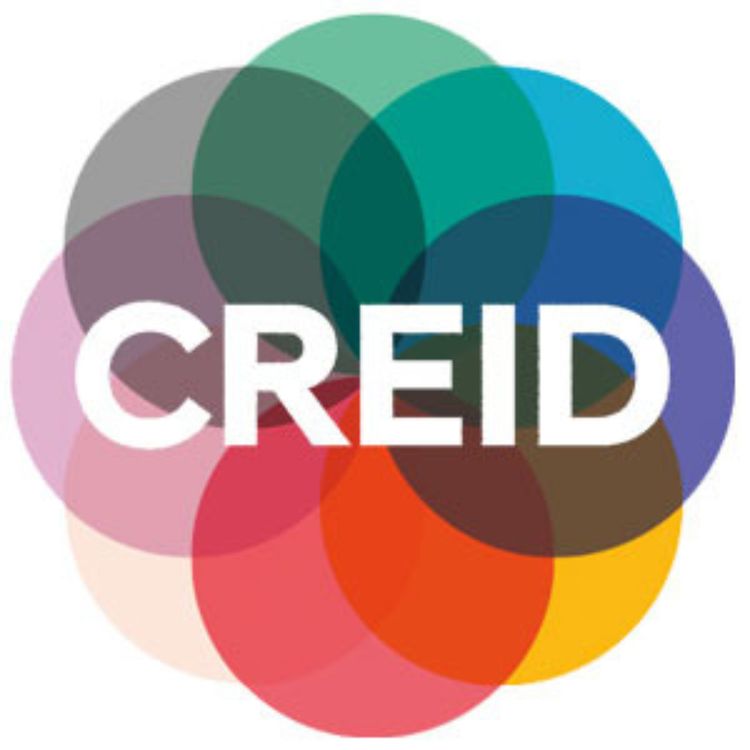
The CREID Podcast
Ideologically motivated sexual grooming of women from religious minorities
In this episode of the CREID podcast, Professor Mariz Tadros, Director of the Coalition for Religious Equality and Inclusive Development (CREID), describes how young women from religious minorities, particularly those from poor and marginalised backgrounds, are being deliberately targeted by men from the majority faith.
Professor Tadros explains how, lured into relationships with flattery, gifts and promises not to be forcibly converted, young women often eventually experience sexual violence. They are then forced into marriage and conversion. This can result in them being rejected by their families and communities. If they do go the police, their cases are often dismissed. It is difficult to gather adequate evidence for prosecution, and the legislation in their countries means they are unable to convert back to their original faiths.
In this podcast, Professor Tadros refers to research on Egypt, India, Iraq, Myanmar, Nigeria and Pakistan.
For more information CREID, visit our web-page.
More episodes
View all episodes
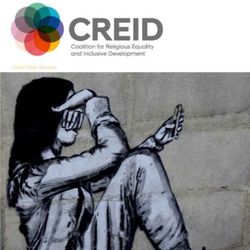
4. Countering online hate speech: creating a counter narrative through good journalism and by working with young people
22:47||Season 2, Ep. 4In this final episode in our series on identifying and countering hate speech, Emily Buchanan speaks to Salam Omer, Editor-in-Chief at KirkukNow in Iraq, Abdul Bari, Bargad in Pakistan and Haroon Baloch, Bytes for All in Pakistan.They discuss the importance of creating a counter narrative for example, through a trusted and neutral news platform, available in local languages, giving voice and sharing positive stories about minority groups (KN); building awareness of hate speech and creating positive narratives working with young people (who represent about 65% of the population in Pakistan) (Bargad), launching "counter campaigns" (for example, the CREID-supported #IDontForwardHate) and reporting outbreaks of hate speech to relevant authorities, such as the tech platforms and the UN Special Rapporteur on Freedom of Religion or Belief.This podcast was originally recorded in March 2021 and launched at "#Incite! Identifying and challenging online hate speech". For more information about CREID, visit our website www.creid.ac or follow us on Twitter @CREID_Dev.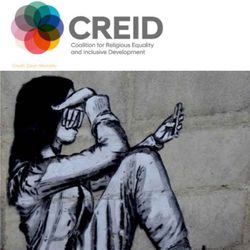
3. Defining the language of hate speech against religious minorities: compiling a lexicon of key words
23:41||Season 2, Ep. 3In the third episode of our series on identifying and countering online hate speech targeting religious minorities, Emily Buchanan speaks to Aila Gill from the National Commission for Justice and Peace in Pakistan and Dr Pshtiwan Faraj, from the Independent Media Organization in Kurdistan in Iraq.They discuss the importance of understanding key words used to denigrate and marginalise minorities which set the scene for the possibility of physical violence and abuse. Defining and understanding such key words helps to build awareness (amongst social media users and the media, for example) around the damage these terms cause. Both NCJP and IMOK have compiled lexicons which collect and explain hateful terms and their plans for raising awareness around these terms include training journalists, and working with young people from both majority and minority groups. This podcast was originally recorded in March 2021 and launched at "#Incite! Identifying and challenging online hate speech". For more information about CREID, visit our website www.creid.ac or follow us on Twitter @CREID_Dev.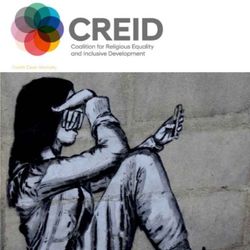
2. Tracking and monitoring online hate speech: keywords and software
25:16||Season 2, Ep. 2In this second episode of our CREID Podcast series focusing on online speech, Emily Buchanan speaks to Haroon Baloch from Bytes for All in Pakistan and Dr Pshtiwan Faraj from Independent Media Organization in Kurdistan in Iraq to discuss how they have trained consumer research software to track and monitor hate speech on social media.Initially, they consulted with a range of stakeholders to identify what key words (often offensive, demeaning and reinforcing existing prejudices) are being used to perpetuate hate speech against religious minorities before programming consumer research software, Brandwatch, to track the use of those key words and where these are being used with malicious and inciteful intent. Their research identifies who initiates hate speech campaigns on social media, and also how hate speech can spike around key events, such as elections. They warn that the right balance needs to be struck between curbing hate speech and allowing freedom of speech, and that some blunt instruments such as Internet shutdowns are not the answer for tackling the problem.This podcast was originally recorded in March 2021 and launched at "#Incite! Identifying and challenging online hate speech". For more information about CREID, visit our website www.creid.ac or follow us on Twitter @CREID_Dev.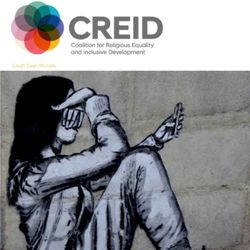
1. Incite! What is causing the rapid spread of hate speech against religious minorities and how can this be countered?
24:47||Season 2, Ep. 1In the first of a new podcast series focusing on identifying and challenging online hate speech which targets religious minorities, Emily Buchanan speaks to Claire Thomas, Deputy Director at Minority Rights Group, and Naumana Suleman, Pakistan Lead and South Asia Coordinator, Minority Rights Group.In this podcast, Emily, Claire and Naumana discuss who the perpetrators of hate speech are, the nature of hate speech and how it impacts ordinary people's lives. This includes daily and commonly used insults, the desecration of cemeteries, signs in shops targeting specific minorities and, in some cases outright violence and death. They also discuss what can be done to counter hate speech and disinformation. Their discussion draws on CREID evidence from Pakistan.This podcast was originally recorded in March 2021 and launched at "#Incite! Identifying and challenging online hate speech". For more information about CREID, visit our website www.creid.ac or follow us on Twitter @CREID_Dev.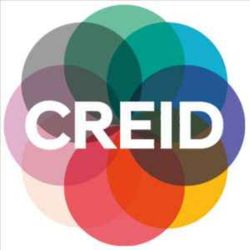
4. May Sabe Phyu: endemic domestic violence in Myanmar and how sexual crimes against minority women go unpunished
19:19||Season 1, Ep. 4Less than two weeks before Myanmar’s national elections, May Sabe Phyu, Director of the Gender Equality Network (GEN), describes how violence against women in Myanmar continues unabated in this latest CREID Podcast. Sexual violence including rape against women from ethnic and religious minorities goes unpunished and a culture of impunity reigns in the country’s many conflict-affected areas.
3. Fatima Suleiman on violence against women in Nigeria
16:38||Season 1, Ep. 3The latest CREID Podcast highlights how violence against women and girls in northern Nigeria is endemic and is fuelled by conflict, poverty and a patriarchal society. In this interview with Fatima Suleiman, Executive Director of the Islamic Counselling Initiative in Northern Nigeria describes gender-based violence against women and girls, which included rape, abductions, sex slavery, sex trafficking, domestic violence and forced involvement in terror activities, and how this increased during Covid-19. She discusses her recent research which looks in particular at the situation of marginalised women from the Izala religious minority.
2. Naumana Suleman on empowering women from religious minorities in Pakistan
26:10||Season 1, Ep. 2In the second episode of the CREID Podcast, which gives a voice to those who work in some of the toughest areas of human rights and development, exploring how religion can impact the opportunities of some of the most vulnerable people in the world, Naumana Suleman, Pakistan Lead at Minority Rights Group, explores the issue of the intersectional discrimination of women from religious minorities in Pakistan.Despite the difficulties of access due to the COVID-19 pandemic, Naumana Suleman, a human rights professional, researcher and trainer specialised in international human rights law, minorities’, women’s and child’s rights, has been working on the invisible problem of violence against poor women from religious minorities in Pakistan. It is when the factors of discrimination collide – religion, gender, but also wealth and social status – that precarity hits the worst, she says, speaking to Emily Buchanan.Often working as sanitation or domestic workers or in factories, women from religious minorities in Pakistan suffer from a male-dominated and religiously biased society. Limited in their opportunities, women endure a differentiated treatment on a daily basis in comparison with Muslim women in the same position. For example, it is not rare for a Christian domestic worker to be given less days of leave than a Muslim worker in the same household. More exposed to violence and powerless in the face of their employers, many women from religious minorities – mostly Christians and Hindus – are often invited to embrace Islam, with the promise or allure of access to a better life. Those who do, however, are most of the time still considered as inferior, originating from non-Muslim backgrounds. Cases of abducted girls, forcefully converted to Islam and married, are also regularly reported.Although Pakistani law formally guarantees religious freedom and equality to all Pakistani citizens, the situation on the ground is often different. This is particularly true when religious minorities are involved; overall, conversions to Islam are generally seen as a good thing to the majority Muslim community, making the matter a political issue supported by officials.Ms Suleman, who originates from the Christian community (religious minority) of Punjab, has been working with CREID partners in Pakistan to address online and offline hate speech against religious minorities, particularly with youth. The team also launched an online survey allowing anyone to report cases of discrimination on any ground. Listen to our podcast to learn more about CREID’s work in Pakistan to tackle intersectional discrimination and promote freedom of religion or belief.